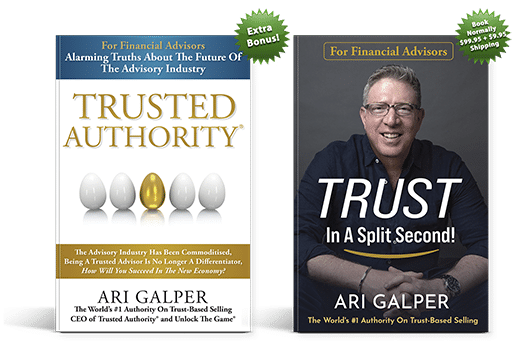Stop Selling With Logic
Advisors approach the sale as though their prospect’s decision to hire them is rooted in logic.
They assume if they can show a net positive benefit that’s greater than what their prospect is currently getting, then that alone will make them the obvious choice.
But it’s not that simple.
If your prospect’s decision to select you as their advisor was purely logical, then every prospect you meet would say “yes”.
The truth is there’s more than logic required here – most importantly, your prospect needs to trust you first.
To build the level of trust required for your prospect to select you as their advisor, especially when they’re meeting with other advisors, you must override your logic-based mindset.
Your work as a financial expert is rooted in logic but your prospect’s decision to hire you is not.
A purely logic-based approach will not satisfy their process of deciding to become your client.
Here’s what your prospect is thinking when you attempt to sell using logic…
“This advisor sounds credible and compelling, they seem to know their stuff. But I’m not a financial expert. How can I trust that this person isn’t just trying to impress me with their knowledge, knowing that I’m not qualified to judge them? I think I’ll not make a decision today”.
When you consider also the logistical complexity involved with transferring assets and how people are fearful of change in general, it’s unlikely that your prospect will want to upset the apple cart so easily.
Building trust is not a mechanical logic-based process.
It’s a perception-based process measured by the empathy and assurance you convey through how you sell, not what you sell.
Presenting the potential benefits of your solution (logic-based) is abstract and somewhat detached from emotion.
Understanding your prospect’s problem and articulating it back to them, so they gain new clarity and insights, is the beginning of a trust-based approach that grounds you at a more human level.
You’re building the impression that you’re more than just knowledgeable… you’re deeply interested in them and their situation, because you care.
In short, your sales approach must be oriented towards diagnosing your prospect’s problem or situation, rather than moving into solution-mode.
Logic is appropriate after you’ve made the sale.
But to make the sale, you need to know how to build trust first, a new skill set many advisors have yet to master.
To learn more about deep trust building from the heart — instead of the head, order your complimentary book and consultation below.
If you're an ambitious advisor, with a defiant streak (following the crowd isn't your thing), who is overly reliant on referrals, with limited time and resources, but willing to grow and challenge your own thinking -- and you'd be happy with 1 – 2 new high-net-worth clients per month...
Get Your Free Book & Free "Get New Clients" Sales & Lead Generation Consultation ASAP!
Order your complimentary new book "Trust In A Split Second" (with free bonus book "Trusted Authority") below and get a free “Get New Clients” sales & lead generation consultation (value $995.00).


In this ground-breaking new book, you’ll discover:
- Why does the sale hinge on a split-second decision!
- "Fit or No Fit" -- does it still work?
- Should you be skeptical of your prospect's agenda?
- Why do fact-finding questions break trust?
- How to differentiate yourself from other advisors
- Why "follow-up" should be banned!
- "We're talking to other advisors"
- Why you should be a financial "doctor" instead of advisor

Meet The Author
Ari Galper is the world’s number one authority on trust-based selling and is one the most sought-after sales conversion experts for advisors and business owners.
He is the creator of Unlock The Game®, a completely new revolutionary sales approach that overturns the notion of selling as we know it today.
Ari has been featured in CEO Magazine, SkyNews, Forbes, INC Magazine and Financial Advisor Magazine – and has been a featured speaker at the Financial Planning Association’s national conference.
His newest book, “TRUST In A Split Second!”, has become an instant best-seller among high-trust advisors worldwide.
With clients in over 35 countries, his global sales systems have become the most successful Trust-Based Selling systems of our time.
In a day and age where technology rules the selling world, for many growth-oriented advisors, deep trust has taken a “back seat” to the sales process.
Ari’s personal insights on how to build trust between buyers and sellers continue to break new ground in virtually every industry.
Ari has been on a mission for the last two decades to change the business world through trust as a foundational principle.
Through his sold-out talks all over the world and his in-house trainings for high-producing advisors, Ari has become the global ambassador to businesses all over the world.
He regularly connects with global business icons and leaders of industries seeking his counsel on how to infuse trust in their organisations and across their teams.
His work in the trust-based selling field, focusing on reversing control of the sales process, from buyer to seller, is considered category-of-one thinking, with over a two decades of proven execution and results.

